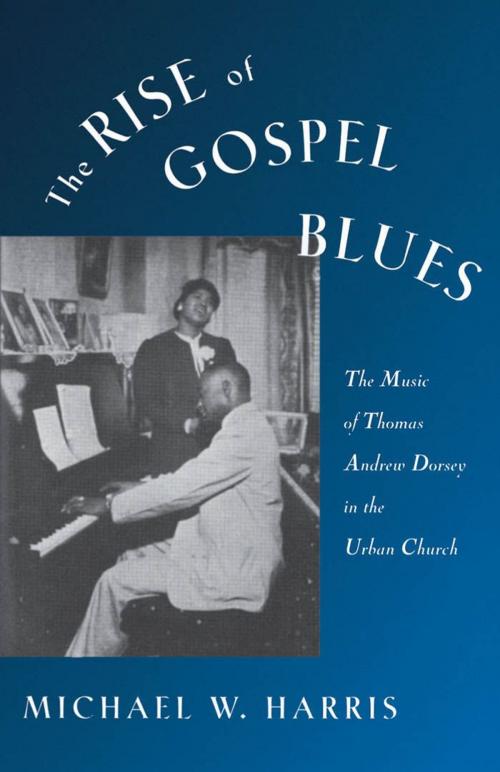The Rise of Gospel Blues
The Music of Thomas Andrew Dorsey in the Urban Church
Nonfiction, Entertainment, Music, Music Styles, Jazz & Blues, Blues, Social & Cultural Studies, Social Science, Cultural Studies, African-American Studies| Author: | Michael W. Harris | ISBN: | 9780199879885 |
| Publisher: | Oxford University Press | Publication: | June 23, 1994 |
| Imprint: | Oxford University Press | Language: | English |
| Author: | Michael W. Harris |
| ISBN: | 9780199879885 |
| Publisher: | Oxford University Press |
| Publication: | June 23, 1994 |
| Imprint: | Oxford University Press |
| Language: | English |
Most observers believe that gospel music has been sung in African-American churches since their organization in the late 1800s. Yet nothing could be further from the truth, as Michael W. Harris's history of gospel blues reveals. Tracing the rise of gospel blues as seen through the career of its founding figure, Thomas Andrew Dorsey, Harris tells the story of the most prominent person in the advent of gospel blues. Also known as "Georgia Tom," Dorsey had considerable success in the 1920s as a pianist, composer, and arranger for prominent blues singes including Ma Rainey. In the 1930s he became involved in Chicago's African-American, old-line Protestant churches, where his background in the blues greatly influenced his composing and singing. Following much controversy during the 1930s and the eventual overwhelming response that Dorsey's new form of music received, the gospel blues became a major force in African-American churches and religion. His more than 400 gospel songs and recent Grammy Award indicate that he is still today the most prolific composer/publisher in the movement. Delving into the life of the central figure of gospel blues, Harris illuminates not only the evolution of this popular musical form, but also the thought and social forces that forged the culture in which this music was shaped.
Most observers believe that gospel music has been sung in African-American churches since their organization in the late 1800s. Yet nothing could be further from the truth, as Michael W. Harris's history of gospel blues reveals. Tracing the rise of gospel blues as seen through the career of its founding figure, Thomas Andrew Dorsey, Harris tells the story of the most prominent person in the advent of gospel blues. Also known as "Georgia Tom," Dorsey had considerable success in the 1920s as a pianist, composer, and arranger for prominent blues singes including Ma Rainey. In the 1930s he became involved in Chicago's African-American, old-line Protestant churches, where his background in the blues greatly influenced his composing and singing. Following much controversy during the 1930s and the eventual overwhelming response that Dorsey's new form of music received, the gospel blues became a major force in African-American churches and religion. His more than 400 gospel songs and recent Grammy Award indicate that he is still today the most prolific composer/publisher in the movement. Delving into the life of the central figure of gospel blues, Harris illuminates not only the evolution of this popular musical form, but also the thought and social forces that forged the culture in which this music was shaped.















